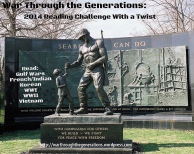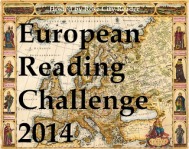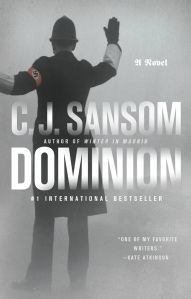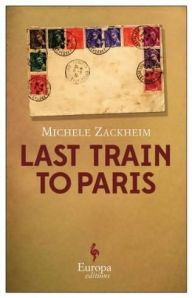
Source: Personal library
Rating: ★★★★★
But then, as MacPherson had said, their job was to carry out the mission and not concern themselves with anything else. Was that right? How could that be right? If he thought that way, he would be no different from the Nazis who had taken his family. They had just been obeying orders, but what they had done was wrong. Deeply wrong.
(from Hitler’s Secret, page 257)
My daughter always does a fantastic job selecting books for me as gifts, and she hit a home run with Hitler’s Secret, which she bought me for Christmas from the Scholastic book fair at her school. William Osborne’s novel centers on two teenagers who escaped the Nazis and are safe in England, only to be recruited as spies for the British government in 1941 and tasked with a mission so important, it just might end the war.
Otto fled Germany in 1940 after the Nazis took away his family because his father was a Communist. Leni is an Austrian Jew who escaped the Nazis with her mother and sisters in 1938, leaving behind her father and brothers. Both immediately agree to help Admiral MacPherson of the Royal Navy despite the dangers involved. Otto will do anything to leave the boarding school where he is bullied for being German, and Leni takes the mission on behalf of her father and brothers.
They are given new identities and tasked with kidnapping a young girl from a convent, getting her over the Swiss border, and turning her over to the British government. They have no idea why this child is so important to the Third Reich and how knowledge of her existence could end the war. Despite being well equipped for the mission, their youth means they are bound to make mistakes. But they are strong and resourceful and accomplish more than I could have in their situation. It’s not long before the Nazis are after them in search of the girl. But Angelika is so important to the Third Reich that Reinhard Heydrich, Lieutenant General of the SS and chief of the Reich Main Security Office, is hunting them down himself. He is ruthless and has no qualms about killing children.
Otto and Leni are such delightful characters. Their actions and emotions are exactly as they should be for teenagers, but the troubles they endured because of the Nazis forced them to grow up too soon. They want to do something to avenge their families, but they didn’t expect to bond with Angelika. As they pose as a family to make their way to Switzerland, they actually become a family — and when they learn the truth about Angelika and the British government’s plans for her, they are forced to question whether carrying out their orders is really the right thing to do.
Hitler’s Secret is a fantastic novel for young readers and adults alike. There is a lot of action, suspense, and even some bloody violence, which isn’t overdone and completely fits the story line. Osborne definitely doesn’t sugarcoat the dangers of the mission, which makes it feel authentic even though it is completely fiction. (There is an author’s note at the end that separates the fact from the fiction and even explains more about the historical figures who make appearances in the novel.)
I loved so many things about this novel, from the well-developed characters and the sheer excitement of the mission to the fact that it both kept me on the edge of my seat and gave me a lot to think about. I finished Hitler’s Secret months ago and am just getting around to reviewing it, but the characters and the plot are still fresh in my mind, which to me is the sign of a great book. I can’t wait to see what book my daughter chooses for me next!
Disclosure: Hitler’s Secret is from my personal library.
© 2014 Anna Horner of Diary of an Eccentric. All Rights Reserved. Please do not reproduce or republish content without permission.















